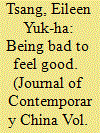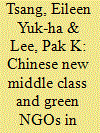| Srl | Item |
| 1 |
ID:
171038


|
|
|
|
|
| Summary/Abstract |
The plight of male migrant workers in China warrants critical attention because their diminished opportunity for life success has created a public health issue. To cope with hopelessness and despair they engage in risky behaviors involving paid sex and drugs. This article extends Connell ’s notion of hegemonic masculinity, linking urban migration with a rampant ‘masculinity crisis’ engulfing these single migrant men. Interviews with 100 male migrants who admitted to regularly buying commercial sex in low-end and mid-tier bars revealed underlying cultural tensions which drive them to use paid sex and drugs to help them cope with their emasculated reality. This article facilitates understanding of China’s masculinity crisis against the backdrop of the nation’s post-socialist transition in a wider social, cultural, and historical structure.
|
|
|
|
|
|
|
|
|
|
|
|
|
|
|
|
| 2 |
ID:
124666


|
|
|
|
|
| Publication |
2013.
|
| Summary/Abstract |
By examining the emerging Chinese new middle class as well as green non-governmental organisations (NGOs), this study finds that while the emergence of the Chinese new middle class facilitates the growth of green NGOs, the Chinese new class are not activists or agitators working against the government. Based on in-depth interviews with leaders of green NGOs in Guangdong Province, this research examines why green NGOs founded by the Chinese new middle class do not call for or advocate environmental protection. It concludes that contrary to conventional wisdom, the Chinese new middle class is a vanguard of guanxi (connections)-seeking, but a laggard in promoting environmental protection and civil-society activism. Green NGOs are principally used as a tool to cultivate social capital in the form of guanxi in order to promote personal material interests.
|
|
|
|
|
|
|
|
|
|
|
|
|
|
|
|
| 3 |
ID:
153352


|
|
|
|
|
| Summary/Abstract |
The relationship between sex workers and their clients is generally characterized as being based entirely on the direct exchange of sexual favours for money. However, this received wisdom cannot account for a nation such as China which attaches significant value to “face,” social status and interpersonal dignity. This paper draws parallels with high-end sex workers elsewhere in Asia as well as globally. With a focus on the high-end sector, I examine how workers and their clients engage not only in pecuniary transactions but also in genuinely intimate and non-remunerative relationships. High-end sex workers make use of their earned economic capital to acquire cultural capital, and use online apps as marketing tools to target local elites and expats to forge longer-term intimate relationships. Male clients in more commercialized, post-industrial cities in China continue to seek diverse types of sexual experiences, with some clients seeking genuine intimacy. Furthermore, I explore how Chinese and foreign clients overcome social barriers to develop such relationships with sex workers. Building on this sociocultural perspective, this paper analyses ethnographically both sides of the female sex worker–client relationship in high-end karaoke lounges and bars in Dongguan, southern China.
|
|
|
|
|
|
|
|
|
|
|
|
|
|
|
|